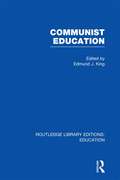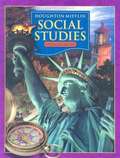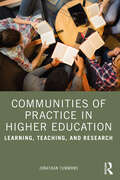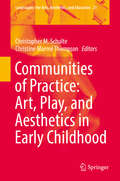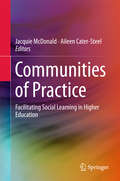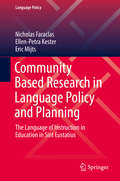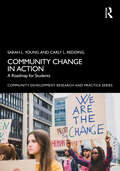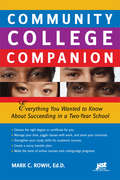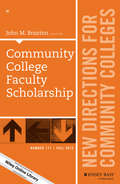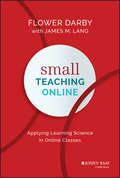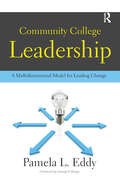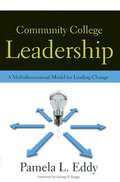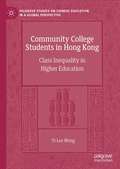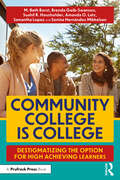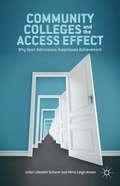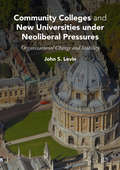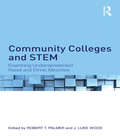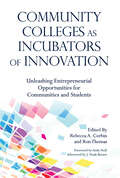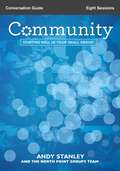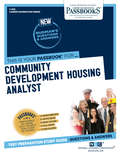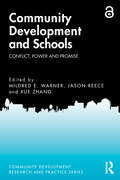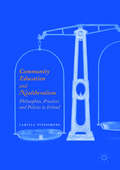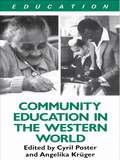- Table View
- List View
Communiquer avec vos enfants - Apprendre à s'écouter et à se parler
by Karen Campbell Isabelle De RoseDès le plus jeune âge, nos qualités de communication sont sollicitées et impactent la dynamique familiale. Si certains parents communiquent effectivement avec leurs enfants, sont-ils vraiment sur la même longueur d'ondes ? Telle est l'essence de la proximité des relations. Tout est question de connexion. Tout simplement. Mais si nous souhaitons avoir des enfants avec lesquels nous pouvons entretenir des liens proches et aimants, nous devons nous employer à établir une vraie connexion. Dès la naissance. Et nous devons nous y employer chaque jour. Ce serait formidable si nous ne devions y travailler que pendant leurs jeunes années... Mais ce n'est vraiment pas le cas. A mesure que les enfants mûrissent et acquièrent leur propre indépendance, la lutte pour la communication prend une toute nouvelle tournure et les techniques que les parents appliqueront renforceront ou, au contraire détruiront, les relations qu'ils ont eu tant de mal à construire.
Communist Education (Routledge Library Editions: Education)
by Len Barton Martin LawnDevelopments and trends in Communist education are traced in this authoritative survey by specialists. Eight chapters deal with particular aspects: ideology, psychology, the selective process, the roles of teachers and parents, polytechnical education, the universities and professional institutes. Three chapters survey the former East Germany, Poland and China as special case-studies. A concluding chapter examines common ground between Communist and other systems.
Communities
by Herman J. Viola Sarah Witham Bednarz Mark C. Schug Charles S. White Maryellen Vogt Cheryl Jennings Dolores Beltra Carlos E. CortésNIMAC-sourced textbook
Communities
by Herman J. Viola Sarah Witham Bednarz Mark C. Schug Charles S. White Maryellen Vogt Cheryl Jennings Dolores Beltra Carlos E. CortésNIMAC-sourced textbook
Communities of Practice in Higher Education: Learning, Teaching, and Research
by Jonathan TummonsDrawing on research and practice, this key text provides a rich, detailed, and accessible guide to Communities of Practice (CoPs) theory and how to implement it within higher education. It takes a detailed look at how the theory is constructed, the research that it rests on, and the ways that it has been used and can be used in the future.Beginning by introducing CoP theory and the theory of learning that accompanies it, this book provides empirical examples of CoP research to illustrate how CoPs form and work within higher education. It also explores how different CoPs work together and can learn from each other. The key topics explored in the book allow the reader to critically understand how CoP theory can be used in higher education to enhance an understanding of how students, staff, and organisations learn.Ideal reading for those researching higher education practices or undertaking higher education teaching qualifications as well as those currently teaching, this book provides a research-led and critical discussion of the current state of CoP-informed research into learning, teaching, and assessment practices alongside and interleaved with an exploration of how this same approach can be utilised for informing research.
Communities of Practice: Art, Play, and Aesthetics in Early Childhood (Landscapes: the Arts, Aesthetics, and Education #21)
by Christopher M. Schulte Christine Marmé ThompsonReflecting contemporary theory and research in early art education, this volume offers a comprehensive introduction to new ways of thinking about the place of art, play, and aesthetics in the lives and education of young children. Enlivened by narratives and illustrations, 16 authors offer perspectives on the lived experience of being a child and discovering the excitement of making meaning and form in the process of art, play, and aesthetic inquiry.
Communities of Practice: Facilitating Social Learning in Higher Education
by Jacquie Mcdonald Aileen Cater-SteelIn this book about communities of practice in the international, higher education sector, the authors articulate the theoretical foundations of communities of practice (CoPs), research into their application in higher education, leadership roles and how CoPs sustain and support professional learning. Research demonstrates that communities of practice build professional and personal links both within and across faculty, student services and administrative and support units. This book describes how community of practice members may be physically co-located and how social media can be used to connect members across geographically diverse locations. It positions higher education communities of practice within the broader community of practice and social learning literature, and articulates the importance of community of practice leadership roles, and the growing focus on the use of social media for community of practice implementation. The multiple perspectives provide higher education leaders, academic and professional staff with the means to establish, or reflect on existing CoPs, by sharing insights and critical reflections on their implementation strategies, practical guidelines and ideas on how community of practice's theoretical underpinnings can be tailored to the higher education context.
Community Based Research in Language Policy and Planning: The Language of Instruction in Education in Sint Eustatius (Language Policy #20)
by Nicholas Faraclas Ellen-Petra Kester Eric MijtsThis volume focuses on a case where community organizing, academic research and governmental responsibility were successfully mobilized and synchronized to bring about change in educational policy and practice. The focus of this book is the methodology implemented and the results obtained over the course of a year-long action research project on language and education in St. Eustatius, one of the islands of the Dutch Caribbean, commissioned by the educational authorities in both St. Eustatius and the European Netherlands. On the island, the language of instruction is Dutch, however, outside of the classroom most students only speak English and an English-lexifier Creole. The research project was set up to address the negative impact on school success of this disparity. It included a community-based sociolinguistic study that actively involved all of the stakeholders in the education system on the island. This was complemented by a multi-pronged set of research strategies, including a language attitude and use survey, a narrative proficiency test, in depth interviews, and a review of the relevant literature. The resulting report and recommendations were accepted by the government, which is now in the process of changing the language of instruction.
Community Change in Action: A Roadmap for Students (Community Development Research and Practice Series)
by Sarah L. Young Carly L. ReddingCommunity Change in Action guides students through the process of turning their personal passion into goal-driven action for community development. Using an evidence-based curriculum, the book breaks down exactly how to initiate and drive social change in a way that speaks to the unique characteristics of Generation Z (Gen Z).Each chapter provides step-by-step actions, analyzes real-life examples, and supplies the necessary tools for success. The authors' multiple decades of experience leading students in community development, both in the United States and abroad, spawn a rich and engaging source for these examples. Each step is highlighted through Gen Z's narrated examples of using the guide and the associated toolkits to implement major social change initiatives, from Native American reservations to the slums of India and beyond.This book takes best practice approaches to youth leadership, community development, and social change beyond the classroom, inspiring and illustrating how Gen Z students can take their passion and turn it into social action.
Community College Companion: Everything You Wanted to Know About Succeeding in a Two-year School
by Mark C. RowhStudents will explore certificate and degree options; connect their needs, plans, and personalities to courses and programs; and gain tips for enhancing their financial aid package and scoring scholarships.
Community College Faculty Scholarship: New Directions for Community Colleges, Number 171 (J-B CC Single Issue Community Colleges)
by John M. BraxtonWhile teaching occupies the primary role of faculty members in community colleges, the question remains: To what extent are community college faculty members engaged in research and scholarship? This issue focuses on: the types of research and scholarship performed by community college faculty, the forces that foster or impede the engagement of community college faculty members in research and scholarship, specific examples of community college faculty scholarship that demonstrate the value of this work to the institution and to larger society, and policies and practices at the institutional, local, and state level that support engagement in research and scholarship. This is the 171st volume of this Jossey-Bass quarterly report series. Essential to the professional libraries of presidents, vice presidents, deans, and other leaders in today's open-door institutions, New Directions for Community Colleges provides expert guidance in meeting the challenges of their distinctive and expanding educational mission.
Community College Finance
by Christopher M. Mullin David S. Baime David S. HoneymanSmart financial management means more students served Community College Finance provides an introduction to best practices for community college leaders and their boards, with guidance on the complex regulations, processes, and considerations surrounding the financial management of these unique institutions. As community colleges continue to increase in importance, this book provides non-technical yet extensive information to guide current and future leaders toward the establishment of effective processes to secure and maintain the funding that is so crucial to the education and future of millions of students nationwide. Readers will gain insight into the background and foundation of community college finance and learn the essentials of practice in today's economic and political climate. The discussion covers student financial aid, tuition, budgeting, and more, and explores the future of federal policy and what it means for the institutions that play such a critical role in the nation's educational system. Over eight million students attend more than a thousand community colleges in the United States today, and those colleges are now facing the retirement of their founding generation of leadership. Meanwhile, the balance between traditional funding sources is shifting as new models and approaches are being implemented, and comprehensive, guiding resources are lacking. This book fills that need with expert insight reflecting current realities and a true understanding of the challenges community colleges face. Readers will: Delve into factors affecting funding and the cost of attendance Develop a budgeting style and process that serves the institution Learn to manage fiscal crises effectively without reducing standards Consider the future of federal policy and how it will affect budgeting At a time when a difficult economy raises questions about the value of higher education, the value that community colleges offer becomes ever more clear. Community College Finance provides the guidance leaders need to help their institutions flourish.
Community College Leadership: A Multidimensional Model for Leading Change
by Pamela L. EddyTwo-year colleges are facing major change. The majority will undergo a turnover in college presidencies in the next ten years, at a time when they are being asked to be engines for economic growth, enable more students – and a greater diversity of students – to gain 21st century qualifications, and provide a pathway to higher degrees, all with reduced state and local funding. Recognizing that future community college leaders – at all levels– will manage increasingly complex organizations, and face very different challenges than their predecessors, this book provides a multidimensional model of leadership suited to these new demands and environments. The model addresses issues of leader cognition, race and gender, the importance of culture, and the need for more collaborative modes of communication and decision making to frame and implement change. It recognizes that there is no longer any one way to lead, and that the next generation of leaders will be more diverse, possess experience and qualifications from a wider variety of careers, and follow new pathways to their positions. Leaders in the future will possess a cultural competency that is fostered by being lifelong learners.Through over 75 individual interviews with leaders and campus members, Eddy is able to provide examples of the model’s components in practice and to illuminate which experiences proved the most relevant for these leaders on their route to upper administration. She shows how her model intersects with the leadership competencies defined by the American Association of Community Colleges, and proposes strategies for future leadership development. This book is intended for anyone considering a leadership position, at any level, in a community college; for college administrators and boards responsible for leadership development programs; and for individuals in corresponding organizations who conduct training programs for aspiring leaders. Likewise, those employed at four-year universities may find value in the model as a developmental tool.
Community College Leadership: A Multidimensional Model for Leading Change (1st Edition)
by Pamela L. EddyRecognizing that future community college leaders--at all levels--will manage increasingly complex organizations, and face very different challenges than their predecessors, this book provides a multidimensional model of leadership suited to these new demands and environments.
Community College Students in Hong Kong: Class Inequality in Higher Education (Palgrave Studies on Chinese Education in a Global Perspective)
by Yi-Lee WongThis book presents a comprehensive account of the educational experiences of community college students in Hong Kong, analyzed through a theoretical lens that intersects sociological theories of inequality, including Bourdieu's concept of cultural capital. The student narratives featured in this book reveal the interweaving personal, academic, and professional considerations and challenges affecting their individual choices in the pursuit of higher education. Chapters also reveal why, despite the relative expansion of educational opportunities, the class gap in higher education persists.
Community College is College: Destigmatizing the Option for High Achieving Learners
by Samantha Lopez Amanda O. Latz M. Beth Borst Sonina Hernández Mikkelsen Suahil R. HousholderCombining research with firsthand experience, Community College Is College demystifies–and destigmatizes–the community college sector.This practical and accessible resource presents community colleges as an option where students who have been identified as high achieving can receive an excellent postsecondary education, often in preparation for transfer to a four-year institution or entry into a high-demand career.Covering topics such as the mission of the community college, dual enrollment, tuition and fees, transfer and career opportunities, this book is a must-read for high school counselors, parents, and caregivers committed to providing students with a complete understanding of the higher education educational options available to them.
Community Colleges And The Access Effect
by Juliet Lilledahl Scherer Mirra Leigh AnsonTaking on the cherished principle that community colleges should be open to all students with a high school education, Scherer and Anson argue that open access policies and lenient federal financial aid laws harm students and present the case for raising the minimum requirements for community college entry.
Community Colleges and New Universities under Neoliberal Pressures: Organizational Change and Stability
by John S. LevinThis book examines seven higher education organizations, exploring their interconnected lines: organizational change and organizational stability. These lines are nested within historical, social, cultural, and political contexts of two nations--the US and Canada--two provinces and three states: Alberta, British Columbia, California, Hawai'i, and Washington. The author studies the development of the community college and the development of the university from community college origins, bringing to the forefront these seven individual stories. Addressing continuity and discontinuity and identity preservation and identity change, as well as individual organizations' responses to government policy, Levin analyzes and illuminates those policies with neoliberal assumptions and values.
Community Colleges and STEM: Examining Underrepresented Racial and Ethnic Minorities
by Robert T. Palmer J. Luke WoodAs United States policymakers and national leaders are increasing their attention to producing workers skilled in science, technology, engineering, and mathematics (STEM), community colleges are being called on to address persistence of minorities in these disciplines. In this important volume, contributors discuss the role of community colleges in facilitating access and success to racial and ethnic minority students in STEM. Chapters explore how community colleges can and do facilitate the STEM pipeline, as well as the experiences of these students in community college, including how psychological factors, developmental coursework, expertiential learning, and motivation affect student success. Community Colleges and STEM ultimately provides recommendations to help increase retention and persistence. This important book is a crucial resource for higher education institutions and community colleges as they work to advance success among racial and ethnic minorities in STEM education.
Community Colleges as Incubators of Innovation: Unleashing Entrepreneurial Opportunities for Communities and Students (Higher Education Ser.)
by Rebecca A. CorbinWhile community colleges have traditionally focused on providing students with opportunities to gain credentials for employment, the increasingly important question is: Are they preparing students for the looming dynamic, disruptive, and entrepreneurial environments ahead? This book addresses the urgent need for community colleges to prioritize entrepreneurship education both to remain relevant in a changing economy and to give graduate students the flexible and interdisciplinary mindsets needed for the future of society. It argues that entrepreneurial education should be offered broadly to a wide range of students, and across all disciplines; defines the key constructs for achieving this objective; and describes how to create entrepreneurial learning environments.The expert contributors, with the support of the National Association for Community College Entrepreneurship (NACCE), start from the premise that community colleges are uniquely positioned to lead entrepreneurial initiatives through both internally-generated curriculum design and through collaboration with the local entrepreneurial community to build bridges between the classroom to the community which in turn can offer models of implementation and constitute a network or support system for students. Community colleges can become incubators of innovation, a magnet for talent, and provide the impetus for development strategies that their communities have not begun to realize. As the chapters make clear, developing an entrepreneurial program itself requires an entrepreneurial mindset that transcends any lack of resources, requiring a spirit of imagination and resourcefulness. This book takes the reader on a journey through the steps needed to build a meaningful, relevant, and sustainable entrepreneurship program, covering program development, curriculum design, appropriate pedagogical approaches, and community engagement.
Community Conversation Guide: Starting Well in Your Small Group
by Andy Stanley Dan Mancini<P>Community. <P>It's a word we often hear, but what does it really mean? And why is it so important to your spiritual life? Because you can’t grow spiritually unless you’re connected relationally.<P> God designed us that way.<P> He wants to use other people to grow us and he wants to use us to grow other people.<P> In this 8-session video-based study (DVD/digital video sold separately), specifically designed for launching new small groups well, you’ll explore how building deep relationships with the people in your small group and serving in the larger community around you will grow your faith.<P> You’ll learn why your unique story matters… to God and to the people you do life with.<P> Community is a great way for small groups to grow together and for churches to connect new people in their congregation.<P> This conversation guide is a necessary tool walking you through each session with group starters, leader’s notes, discussion questions, and weekly reading.<P> Sessions include: Show Up Pursue God Join In Be Real Part 1 Be Real Part 2 Be Real Part 3 Be the Church Be Together Designed for use with Community Video Study (sold separately).
Community Development Housing Analyst: Passbooks Study Guide (Career Examination Series)
by National Learning CorporationThe Community Development Housing Analyst Passbook® prepares you for your test by allowing you to take practice exams in the subjects you need to study. It provides hundreds of questions and answers in the areas that will likely be covered on your upcoming exam, including but not limited to: understanding and interpreting and applying housing and community development laws, rules and regulations; understanding and interpreting plans and specifications; preparing written material; and other related areas.
Community Development and Schools: Conflict, Power and Promise (ISSN)
by Mildred E. Warner Xue Zhang Jason ReeceThis book lays out the promise and potential of schools as community-building institutions. It explores the challenges faced in incorporating schools into broader community development policy, and also recognizes the changing demographics of schools and their need to integrate with economic development policy in order to promote broader community development.The book includes chapters on tax abatements and economic development policy impacts on schools, new approaches to school building renovation, the potential and reach of shared services between communities and schools, and the impact of school-based health centers. It also offers a theory to integrate schools into community development. Key elements include shared power between communities and schools, greater transparency in economic development policy, collaboration across the broad range of community actors, and engagement of diverse voices. These elements build a greater sense of belonging across generations and class and racial divides.Creative democracy can broaden both school and community development agendas and build a culture of health. This book will help community development and school leaders recognize and pursue the promise of schools as critical community development actors.The Open Access version of this book, available at http://www.taylorfrancis.com, has been made available under a Creative Commons Attribution-Non Commercial (CC-BY-NC) 4.0 license.
Community Education and Neoliberalism: Philosophies, Practices and Policies in Ireland
by Camilla FitzsimonsThis book explores community education in Ireland and argues that neoliberalism has had a profound effect on community education. Rather than retain its foundational characteristics of collective, equality-led principles and practices, community education has lost much of its independence and has been reshaped into spaces characterised by labour-market activation, vocationalisation and marketisation. These changes have often, though not always, run contrary to the wishes of those involved in community education creating enormous tensions for practitioners, course providers and participants.
Community Education and the Western World
by Angelika Krüger Cyril PosterFirst published in 1990. Routledge is an imprint of Taylor & Francis, an informa company.

